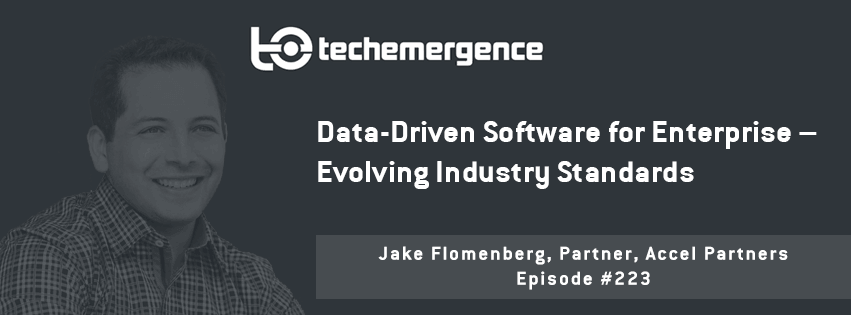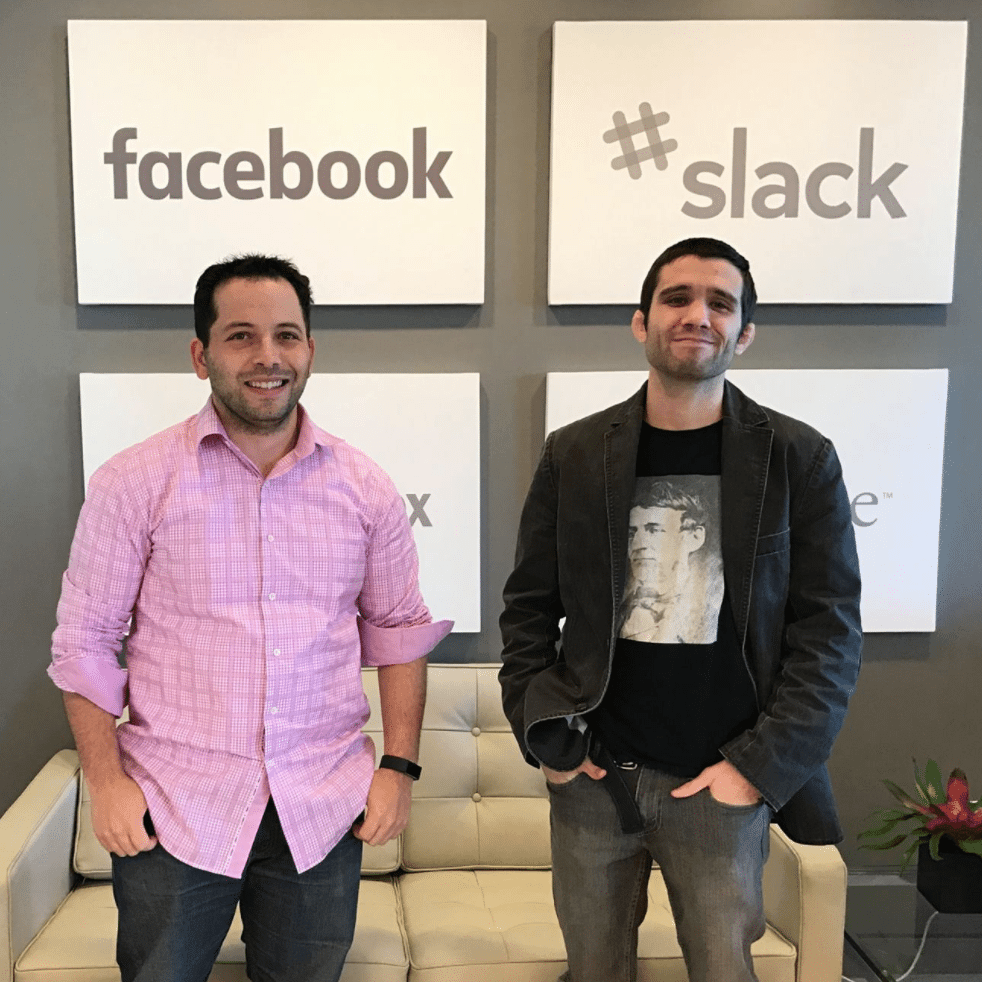
Episode Summary: At Emerj, we like to look around the corner at where AI is impacting industries and how people can make better business decisions based on that information. AI and data-driven software for enterprise is an emerging topic of interest, and in this episode we get a venture capitalist’s perspective on where AI will play a vital and necessary role with real results in software and industry.
Jake Flomenberg, a partner with venture capital firm Accel in Palo Alto, shared his insights on how software can integrate AI in intuitive and valuable ways for users. He cites some of the companies that Accel has invested in to illustrate some of the potential software features that may be introduced to the enterprise in the next five years or so. Flomenberg’s insights may be useful for anyone building a business or planning to buy a product or service from a software vendor in the near future. If you’re interested in getting other founders’ perspectives on the feedback and interest shown by investors in their startups, our AI startup consensus on investor sentiment is a good place to start.
Expertise: Next-generation infrastructure, enterprise software, and security investments
Brief Recognition: Jake Flomenberg is part of the team responsible for Accel’s Big Data Fund and has led investments in such companies as Demisto, Origami Logic, and Zoomdata. Before joining Accel, he worked at Cloudera. He is a graduate of Duke University, has a Masters in Engineering from the University of Pennsylvania, and an MBA from Harvard Business School.
Current Affiliations: Partner at Accel
Big Ideas:
 1 – Proprietary Data Streams Over “Having the Best Algorithms”
1 – Proprietary Data Streams Over “Having the Best Algorithms”
AI alone is not enough — the quality and uniqueness of data is more often than not the real differentiator for technology developers and founders who want to show they can take the next steps in advanced analytics. Unfortunately, some startups use AI as a crutch for their business plans, which collapse in on themselves without a solid strategy for moving the business forward. Businesses that prove their capability in collecting and making use of valuable, proprietary data are likely to be those that become successful companies in the long-term. Netflix certainly has impressive core AI technology behind its platform, but its industry dominance comes more from a near-infinite stream of user interactions and behavior that allow the company to tailor a more customized, addictive experience to all of it’s subscribers.
Turning Insight Into Action
Take your ML algorithm or network out of the equation—can you articulate your company’s value proposition without expounding on how the AI/ML technology that you’re using works? If no, time to go back to the drawing board and answer some key data-related questions, such as: 1) What consumer/business outcomes does my service drive? 2) What are the data streams that will inform and optimize this outcome? 3) How are we collecting this data over time and what makes our data unique compared to our competitors?
Interview Highlights:
The following is a condensed version of the full audio interview, which is available in the above links on Emerj’s SoundCloud and iTunes stations.

(3:11) There’s a whole ecosystem of companies where selling software is their core value proposition. Is something similar happening with AI or is the dynamic different here?
Jake Flomenberg: I think of it through a couple of different lenses. The first is horizontal versus vertical, and the second might be data, is data-driven software eating the world. To the horizontal question, we’ve been fortunate enough to invest in a number of successful data management companies, data delivery companies, data prep companies, BI companies, and the question we run into when it comes to AI is, is there a horizontal platform? How many people have enough data and have enough sophisticated end users to make use of such a platform, and what is the durable basis for competition for that platform?
One thing we fundamentally do not believe in is that someone is going to have durably differentiable algorithm in the limit, meaning most things that are invented in computer science tend to seep their way out to the rest of the world. I think proof positive of this is Google’s decision to open source TensorFlow…but that’s really an interesting stake in the ground; even Google is saying, ‘hey our algorithms are not our differentiating advantage, it’s actually our data…so data is the lens through which we really evaluate our early-stage opportunities.
(8:09) Is AI a layer and maybe an underpinning of some of the software that is embedding itself into the various systems around us?
JF: I think software and AI are coupled together. Unfortunately, I think there is a little bit of divergence between AI and the common parlance that implies some kind of sentience that might not exist in a purely academic definition, and that’s why I come back to data and perhaps something as simple as recommendations as its roots.
If you look at a lot of the public consumer services like a Google, a Facebook, a LinkedIn, etc., they always have that next best thing right there for you. They have to crunch a lot of data, whether it’s the article you want, the person you want to connect, and that’s the opportunity that really exists in every other facet our lives. I think we’re much further behind in the physical world, in the enterprise world to compare where we already are as internet and social consumers. That’s the opportunity, and you could call it an AI opportunity. I call that an opportunity to build data-driven, intelligent software.
(9:54) Are there good examples of those same notions (like Google, LinkedIn, etc.) being pulled into other kinds of software, stuff you’re investing in?
JF: Yeah; ya know, it’s hard and it’s unfair to put early-stage companies in the same stratosphere…I think there’s a lot going on in AI in the security domain for instance, and we have a lot of companies…that use a lot of advanced analytics to help find the threat…one of the younger companies in the security space that’s sort of in the early days in this and that I’m excited about is a company I work with called Demisto, and they help incident responders do their job more efficiently…they’re a security command line on steroids that integrates with all of your existing security tools combined with a chat interface, and what this allows is the instant responder to spend the vast majority of his time during the day in this tool…and by doing that what they wind up with is a system of record for the incident i.e. what the security professional is actually doing…it’s a very small amount of high-intent data, and then a company like Demisto is able to take that data and learn from it.
(13:27) If you have a software and you do certain creative, different, responsive things, is there a way to blend this into some kind of rule or process that streamlines the company?
JF: Absolutely, and that’s what we try to spend all of our time doing. It’s this unique sort of blend of a domain knowledge and how to bring modern data infrastructure and analytics to bear. That’s a group of people that unfortunately doesn’t get together and team up as often as we’d like to see. If you’re in the pure, horizontal AI business, I think you have your work cut out for you. You have Google and Facebook. That a tough roster.
(16:28) Nowadays, I don’t see much (investment) on your wall that isn’t more or less predicated on the internet. Are we to expect that, far enough into the future…things will become similar with AI, where technologies that aren’t immediately responsive and helpful and learning from you won’t be “real” companies and won’t be coming in and pitching you five or seven years from now; or do you think will that it be more sequestered to a corner of companies, unlike the internet, maybe everybody doesn’t need (AI) to have a legitimate business model?
JF: Much like connectivity has permeated the world with the internet, I think data-driven software is going to permeate the world. Now, there may be different pockets where localized learning makes sense i.e. learning that is in the four walls of my company. If I’m a government agency or I have sensitive data, maybe I want the bounds of that learning to be within my company, but for an increasing number of people they want that learning to be centralized. Sort of the wisdom of the crowd, how can I in a privacy-conscious manner share the learnings across the companies is a common refrain, and to the extent that that will improve the product or service, I think it’s going to be do or die.





 1 – Proprietary Data Streams Over “Having the Best Algorithms”
1 – Proprietary Data Streams Over “Having the Best Algorithms”





